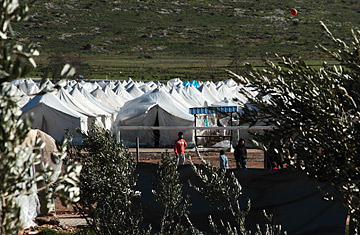
Syrian children play soccer inside a refugee camp in Reyhanli, Turkey, on March 4, 2012
(2 of 2)
The opposition could use plenty more coaching, says Mohammad Bassam Imadi, a former Syrian ambassador who openly denounced the government of Bashar Assad back in December, becoming one of the highest-ranking officials to swell the ranks of the SNC. "I wish the Turkish government would do a little more to help [us] in terms of structuring, sharing experiences and training," says Imadi. Although the SNC has managed to attract a number of groups under its umbrella, including Kurds, Alawites and Christians, it has been plagued by internal divisions, indecisiveness and a lack of transparency. Unless it gets its act together, Imadi fears, the group may soon slide into irrelevance. "The Syrian people have accepted this council in order to represent their demands before the international community," he says. "If it does not represent their point of view, what's the use for it? Where is its legitimacy?" Of what he refers to as the Syrian people's demands, Imadi names just one, the most important, as he sees it — to provide weapons to the FSA.
Imadi and Khoja both maintain that Turkey has never played favorites inside the SNC. There is a logic to this, argues Khoja. "They are working to win the opposition's trust," he says. "Turkey knows that Bashar will go down and that the Syrian opposition will be more effective in the next stage. Turkey will have wider, more effective relations with the next Syrian regime than it ever did with Assad."
Even if Assad's demise is a matter of time, there remains a small detail — whether, and how, Turkey and the rest of the world can hasten it. According to Cengiz Candar, a Turkish columnist, Ankara cannot proceed further than it already has without international backing. With no diplomatic cover, a Turkish decision to arm the FSA and allow it to stage attacks from Turkish territory will mean "the beginning of war with Syria," says Candar. That, in turn, would exacerbate tensions between Turkey and its near abroad, meaning Iraq, Iran and Russia, inviting the threat of further regional turmoil.
Already, there is resentment in Ankara at what many there perceive as a Western attempt to outsource the Syrian conflict. "It's as if everyone else were watching a football match, standing on the sidelines and saying, It's Turkey's role to handle this," Cemil Cicek, the Speaker of parliament, complained in a recent interview. "Turkey has as much responsibility for resolving these conflicts as everyone else."
On Tuesday, with the U.N. estimating the death toll since the beginning of protests last March at well over 7,500, Turkish Prime Minister Recep Tayyip Erdogan called for the immediate establishment of humanitarian-aid corridors in Syria.
Al-Kurdi, the rebel commander, expects much more. "What we want from Turkey is a buffer zone. There are tens of thousands soldiers in the Syrian army who want to defect but don't know where to go," he claims. "If we have a free zone adjacent to the Turkish border, the army can separate, and many will defect. Once they have a free zone, something like Benghazi in Libya, that would be the end of the Syrian military."
At this point, al-Kurdi says, "we don't need sympathy, we need help and we need decisions." "If there's no help from the outside now, it is certain that there'll be a civil war. Syria will become like Somalia, and the war will never stop."
